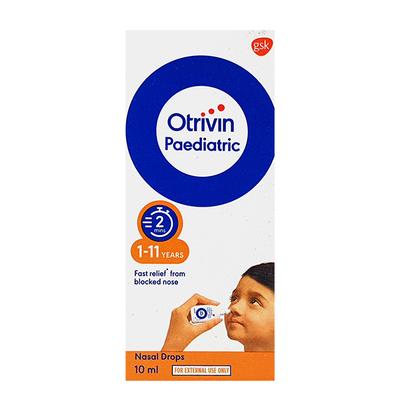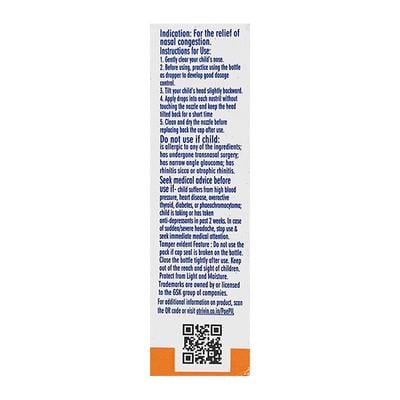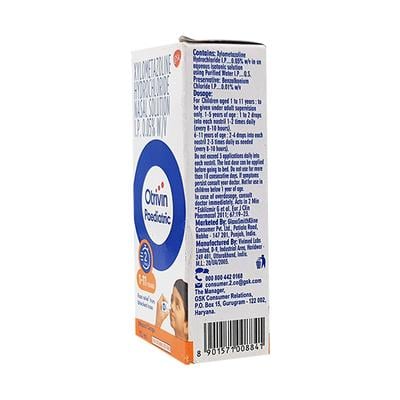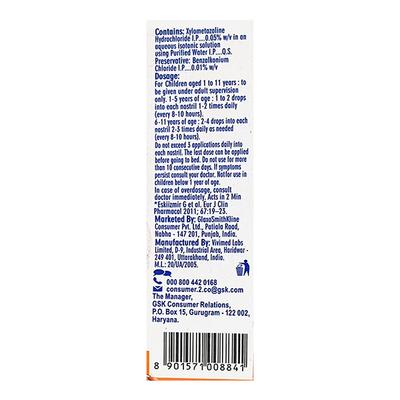

Netmeds First Membership
Quick Links
Introduction About OTRIVIN PAEDIATRIC NASAL DROPS
Otrivin Paediatric Nasal Drops is a nasal decongestant used to relieve blocked nose in colds, perennial and allergic rhinitis (rapidly occurring inflammation of the nasal mucous membranes), hay fever, and sinusitis. It contains xylometazoline hydrochloride as an active ingredient that helps to reduce swelling and congestion.
Xylometazoline hydrochloride helps to quickly relieve a blocked nose and allow to breathe normally by helping to open up and clear the nasal passages by reducing the excessive nasal secretions and returning the swollen blood vessels to their normal size.
Always use Otrivin Paediatric Nasal Drops as directed by the physician. Do not exceed the recommended dosage. Do not use the drops for more than 10 consecutive days as prolonged use may lead to stiffness of the nose. It is not suitable for use in children below 1 year of age.
Key Composition
- Xylometazoline Hydrochloride
Therapeutic Uses Of OTRIVIN PAEDIATRIC NASAL DROPS
Used to relieve blocked nose in conditions like
- colds
- perennial and allergic rhinitis including hay fever
- sinusitis
Side Effects Of OTRIVIN PAEDIATRIC NASAL DROPS
Otrivin Paediatric Nasal Drops may cause local burning sensation, irritation or dryness of nasal mucosa, nausea and headache in some children. Consult your doctor if you notice any such side effects while using it.
Safety Advice
- Always use Otrivin Paediatric Nasal Drops as directed by the physician
- Use 1-2 Otrivin Paediatric Nasal Drops per nostril once or twice daily (every 8 to 10 hours) for children 1-5 years of age
- The usual recommended dosage for children 6-11 years of age is 2 to 3 times per nostril daily or as advised by your doctor
- Gently clean your child’s nose
- Tilt your child’s head slightly back (as far as comfortable)
- Apply Otrivin Paediatric Nasal Drops very carefully into each nostril without touching the nose and keep the head tilted back for a short time to allow drops to spread out throughout the nose
- If the drop completely misses the child’s nose, simply administer the drop again
- If any part of the drop gets into the nose do not administer the drop again
- Repeat with another nostril
- To manage infection from spreading, the bottle should only be used by one person only
- Otrivin Paediatric Nasal Drops is not suitable in children below 1 year of age
- Do not exceed 3 applications daily into each nostril and try to make the last application shortly before going to bed
- Otrivin Paediatric Nasal Drops should not be used for more than 10 consecutive days. If symptoms persist, consult your doctor
- Otrivin Paediatric Nasal Drops is not recommended in children suffering from narrow angle glaucoma (increased pressure in the eyes) or undergone any recent trans-nasal surgery (brain surgery) where the operation was carried out through nose and mouth
- Otrivin Paediatric Nasal Drops should not be used in children having chronic nasal inflammation with very dry nasal passages
- Otrivin Paediatric Nasal Drops should be used with caution in children having increased blood pressure or other heart diseases, hyperthyroidism (over active thyroid gland), diabetes (high blood sugar), pheochromocytoma (rare tumour of the brain) and prostatic hypertrophy (enlargement of prostate gland)
- Inform your doctor on all the medicines your child uses, including prescription, over-the-counter medications and herbal supplements
More Information
- Keep Otrivin Paediatric Nasal Drops out of reach and sight of children
- Store Otrivin Paediatric Nasal Drops in a cool place
FAQs About OTRIVIN PAEDIATRIC NASAL DROPS
Q: What is Otrivin Paediatric Nasal Drops used for?
A: Otrivin Paediatric Nasal Drops is a nasal decongestant containing xylometazoline hydrochloride as an active ingredient that is used to relieve blocked nose in colds, perennial and allergic rhinitis (rapidly occurring inflammation of the nasal mucous membranes), hay fever, and sinusitis.
Q: How do you use Otrivin Paediatric Nasal Drops?
A: Use Otrivin Paediatric Nasal Drops as directed by the doctor. Gently clean your child’s nose. Tilt your child’s head slightly back (as far as comfortable). Apply very carefully into each nostril without touching the nose and keep the head tilted back for a short time to allow drops to spread out throughout the nose. Repeat with another nostril.
Q: Is Otrivin Paediatric Nasal Drops safe for babies?
A: Otrivin Paediatric Nasal Drops is indicated for use in children aged 1-11 years of age only under adult supervision. It is strictly contraindicated in children below 1 years of age. Consult your child’s doctor before using it.
Q: What are the side-effects of using Otrivin Paediatric Nasal Drops?
A: Otrivin Paediatric Nasal Drop may cause local burning sensation, irritation or dryness of nasal mucosa, nausea and headache in some children. Consult your doctor if you notice any such side effects while using it.
Q: For how long can I use Otrivin Paediatric Nasal Drops?
A: Do not use Otrivin Paediatric Nasal Drops for more than 10 days or for longer than directed because prolonged or excessive use may cause stuffiness in the nose to return or worsen. If this occurs, stop using it and consult your doctor.
References
1. https://www.otrivin.co.in/products/otrivin-baby-saline-solution-monodose/
2. https://www.otrivin.co.in/content/dam/cf-consumer-healthcare/otrivin-v3/en_IN/PILs/IN-Otrivin%20Paediatric%20Product%20Information%20Leaflet%20(1).pdf















